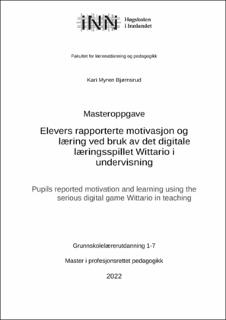| dc.contributor.advisor | | |
| dc.contributor.author | Bjørnsrud, Kari Myren | |
| dc.date.accessioned | 2022-09-20T16:18:14Z | |
| dc.date.available | 2022-09-20T16:18:14Z | |
| dc.date.issued | 2022 | |
| dc.identifier | no.inn:inspera:109713146:32312570 | |
| dc.identifier.uri | https://hdl.handle.net/11250/3019782 | |
| dc.description.abstract | Formålet med denne oppgaven har vært å undersøke hvordan det digitale læringsspillet Wittario har påvirket 5. og 6. trinns elevers opplevde motivasjon og læring i matematikkundervisning. Bakgrunnen for oppgaven er elevers rapporterte synkende motivasjon siden 2016 og et økt fokus på kompetanser for det 21. århundre.
Tidligere forskning viser at digitale læringsspill kan virke motiverende fordi de legger opp til tilfredsstillelse av behovet for autonomi, behovet for tilhørighet og behovet for kompetanse og mestring. Det finnes også flere eksterne faktorer som kan påvirke elevenes motivasjon, som belønning og konkurranse. Likevel, selv om læringsspill kan øke elevers motivasjon, er det mye usikkerhet knyttet til læringsutbyttet.
Det teoretiske rammeverket for oppgaven er selvbestemmelsesteorien, teorien om forventing om mestring, Vygotskys sosiokulturelle læringsteori og Deweys konstruktivistiske læringsteori. Undersøkelsen har en kvalitativ tilnærming og datamaterialet er hentet fra elleve elevgruppeintervjuer. Hver elevgruppe bestod av fire til seks elever, og intervjuene ble gjort på tre skoler på Østlandet.
Resultatene tyder på at Wittario dekker ulike psykologiske behov hos elevene, og at det derfor fører til mestring for flere elever. Det kan virke som at det er elever som ikke er helt tilfreds med ordinær klasseromsundervisning, som har opplevd størst endring i motivasjon. Elevene rapporterer at de lærer bedre blant annet fordi de kan samarbeide og være aktive i selve læringsprosessen. Det skal likevel tas i betraktning at det ikke gjelder alle elever. Resultatene tyder også på at læringsspillet danner et godt utgangspunkt for å utvikle flere kompetanser for det 21. århundre. | |
| dc.description.abstract | The purpose of this thesis has been to investigate pupils reported motivation and learning using a serious digital game in teaching. It investigates how the digital learning game Wittario has affected 5th and 6th grade pupils' perceived motivation and learning in mathematics teaching. The background is pupils' reported declining motivation since 2016 and an increased focus on competencies for the 21st century.
Previous research shows that digital learning games can be motivating because they lead to the satisfaction of the need for autonomy, belonging, and competence and mastery. Several external factors can affect students' motivation, such as rewards and competition. Nevertheless, although learning games can increase students' motivation, there is a lot of uncertainty associated with learning outcomes.
The theoretical framework for the thesis is the theory of self-determination, the theory of expectation of mastery, Vygotsky's socio-cultural learning theory and Dewey's constructivist learning theory. The survey has a qualitative approach, and the data material is collected from eleven group interviews. Each group consisted of four to six pupils, and the interviews were conducted at three schools in Eastern Norway.
The results show that Wittario to a certain extent covers different psychological needs and leads to a feeling of mastery for many pupils. It may seem that pupils who are not completely satisfied with ordinary classroom teaching, experienced the most significant change in motivation. The pupils report that they learn better, partly because they can collaborate and be active in the learning process. However, it should be borne in mind that this does not apply to all pupils. The results also indicate that the digital learning game forms a good starting point for developing more skills for the 21st century. | |
| dc.language | nob | |
| dc.publisher | Inland Norway University | |
| dc.title | Elevers rapporterte motivasjon og læring ved bruk av det digitale læringsspillet Wittario i undervisning | |
| dc.type | Master thesis | |
